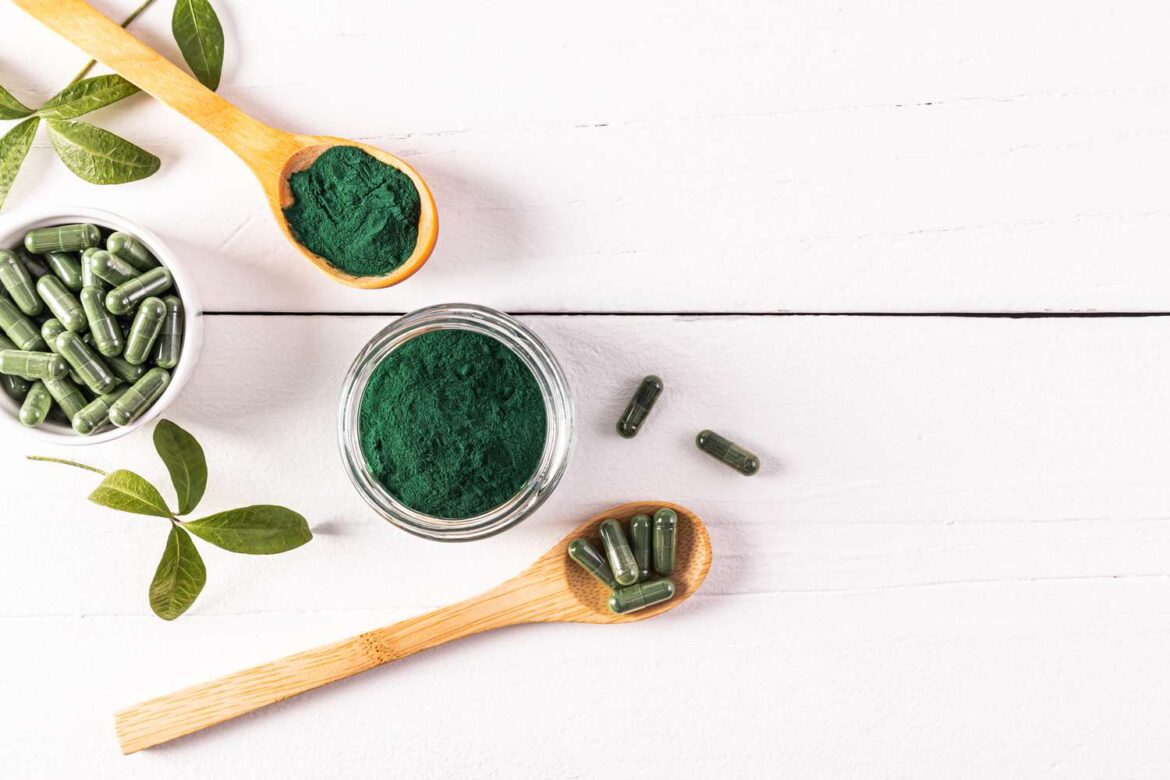Chlorella powder is a vibrant, green algae “superfood” popping up in supplements on organic store shelves and in celebrity-endorsed smoothies.
This freshwater microalgae contains protein, fiber, vitamins, minerals, and omega-3 fatty acids, and is said to have powerful anti-inflammatory benefits. Chlorella also contains chlorophyll, which has antioxidant properties and gives the algae its signature green color.
Chlorella has been compared to the high-protein blue-green algae spirulina, a popular juice bar ingredient that adds a natural blue hue to smoothies and bowls.
“Both chlorella and spirulina have been marketed to help with various conditions—from cardiometabolic health and macular degeneration to dental infections and diagnosed mental illnesses,” Emma M. Laing, PhD, RDN, FAND, a clinical professor and director of dietetics at the University of Georgia, told Verywell in an email.
While studies suggest that chlorella could help lower blood pressure, reduce cardiovascular disease risk, and prevent certain diabetes complications, most of these studies have been conducted on animals.
Social media users have raised concerns that chlorella supplements may contain heavy metals or bacterial toxins despite the potential health benefits.
How Do Chlorella and Spirulina Compare?
Chlorella and spirulina offer similar health benefits and contain many of the same vitamins and minerals. These algae are sometimes packaged together in the same dietary supplement, but you can also try either individually for slightly different nutrient profiles.
“Chlorella has more vitamin A and omega-3 fats, whereas spirulina has more vitamin E, vitamin K, and protein,” Sue-Ellen Anderson-Haynes, MS, RDN, a Boston area-based registered dietitian and spokesperson for the Academy of Nutrition and Dietetics, told Verywell.
Research has suggested that both chlorella and spirulina supplementation help lower LDL or “bad cholesterol” levels, but more studies are needed to confirm these benefits.
Is Chlorella Safe?
Spirulina, chlorella, and other algae supplements can contain heavy metals if they absorb these from the water during the growing process.
“Heavy metals are a big concern. It depends on where it is grown. Not all samples will have the heavy metals,” Muraleedharan G. Nair, PhD, a professor emeritus in the department of horticulture at Michigan State University, told Verywell.
Most people shouldn’t worry too much if they only consume chlorella in moderate amounts. However, in addition to concerns about heavy metals, chlorella can cause nausea, gas, abdominal cramps, and allergic reactions, including anaphylaxis, in some people.
Studies have tested various chlorella doses, and while it seems safe for some people to take up to 15 grams daily, the ideal amount is unknown.
The U.S. Food and Drug Administration (FDA) does not approve dietary supplements, like chlorella, for safety before they hit the market.
It is important to consult a healthcare provider before starting new dietary supplements, including chlorella or spirulina. These may interact with or impact the effectiveness of other medications you are taking, like blood thinners and immunosuppressant drugs, Anderson-Haynes said.
Should You Try Chlorella?
Chlorella provides a variety of nutrients like omega-3, protein, and calcium. This alga is typically sold as a powder, tincture, or a tablet.
“Though you can technically eat chlorella ‘whole’ after it has been harvested, humans cannot digest the hard cell walls when chlorella is consumed in its natural state. When chlorella is manufactured as a dietary supplement, the cell walls are disrupted or mechanically broken down,” Laing said.
You can easily add chlorella powder to a smoothie, but like spirulina, some people complain that chlorella has a “fishy” taste.
“Taking chlorella in tablet or capsule form or combining it with other flavorful ingredients can help mask the taste,” Laing said.
If you want to try chlorella powder, mix it into apple sauce, salad dressing, coffee, chai, or matcha to improve the flavor. Keep experimenting until you find something that works for you, she added.
What This Means For You
Chlorella is a bright green algae used as an anti-inflammatory supplement to reduce the risk for various chronic conditions. However, it can contain heavy metals and cause an allergic reaction and GI symptoms. It’s best to talk with your doctor before adding it to your wellness routine.

